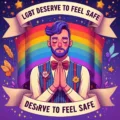A Journey of Self-Discovery and Healing
In a world that often struggles to understand and accept diverse identities, the journey of a lesbian in recovery is one of profound courage and resilience. This article explores the unique challenges and triumphs of individuals who navigate both their sexual identity and the path to recovery from addiction or mental health issues. By sharing stories of hope and healing, we aim to foster greater compassion and understanding for those who sit in the metaphorical chair of recovery.
Embracing Identity in the Face of Adversity
For many LGBTQ+ individuals, the process of coming to terms with their sexual orientation can be a challenging and emotional journey. When coupled with the struggles of addiction or mental health issues, this journey becomes even more complex. However, it’s important to recognize that embracing one’s true identity is often a crucial step in the recovery process.
Many lesbians in recovery report that accepting and loving themselves for who they are has been instrumental in their healing journey. By finding the strength to be authentic, they create a solid foundation for lasting recovery and personal growth.
The Intersection of LGBTQ+ Issues and Mental Health
Research has shown that LGBTQ+ individuals are at higher risk for mental health issues and substance abuse problems due to factors such as discrimination, social stigma, and internalized homophobia. Understanding this intersection is crucial for providing effective support and treatment.
- Higher rates of depression and anxiety among LGBTQ+ individuals
- Increased risk of substance abuse as a coping mechanism
- The importance of LGBTQ+-affirming therapy and support groups
By addressing these unique challenges head-on, we can create more inclusive and effective recovery programs that cater to the specific needs of lesbians and other LGBTQ+ individuals.
Building a Supportive Community
One of the most powerful tools in recovery is the support of a caring community. For lesbians in recovery, finding a network of individuals who understand both their sexual identity and their recovery journey can be transformative.
Many cities now offer LGBTQ+-specific recovery meetings and support groups, providing safe spaces for individuals to share their experiences and find solidarity. These communities can offer:
- A sense of belonging and acceptance
- Shared experiences and coping strategies
- Opportunities for mentorship and personal growth
- A safe space to explore both identity and recovery
Celebrating Milestones and Progress
Recovery is a journey, not a destination. For lesbians in recovery, it’s essential to celebrate both small and large victories along the way. These milestones might include:
- Achieving sobriety milestones
- Coming out to friends and family
- Attending their first LGBTQ+ pride event sober
- Helping others in their recovery journey
By acknowledging and celebrating these accomplishments, individuals can build confidence and motivation to continue their path of healing and self-discovery.
The Power of Representation and Role Models
Seeing oneself reflected in society and media can have a profound impact on self-esteem and personal growth. For lesbians in recovery, having visible role models who share similar experiences can be incredibly empowering.
From LGBTQ+ celebrities who openly discuss their recovery journeys to local community leaders who inspire through their actions, these role models demonstrate that it’s possible to overcome challenges and live authentic, fulfilling lives.
Frequently Asked Questions
1. What unique challenges do lesbians face in recovery?
Lesbians in recovery may face additional challenges such as discrimination, lack of family support, and difficulty finding LGBTQ+-affirming treatment options. They may also struggle with internalized homophobia and the process of coming out while simultaneously working on their recovery.
2. Are there specific recovery programs for LGBTQ+ individuals?
Yes, many cities offer LGBTQ+-specific recovery meetings, support groups, and treatment programs. These specialized programs address the unique needs and experiences of LGBTQ+ individuals in recovery.
3. How can allies support lesbians in recovery?
Allies can support lesbians in recovery by educating themselves about LGBTQ+ issues, using inclusive language, advocating for LGBTQ+ rights, and creating safe and welcoming spaces for all individuals, regardless of sexual orientation or gender identity.
4. Is it necessary to come out during the recovery process?
Coming out is a personal decision and should be made when an individual feels ready and safe to do so. While being open about one’s identity can be beneficial for some in recovery, it’s not a requirement for successful healing and growth.
5. How can lesbians in recovery maintain their sobriety while participating in LGBTQ+ social events?
Maintaining sobriety at LGBTQ+ social events can be challenging, but it’s possible with proper planning and support. Strategies may include attending events with sober friends, having an exit plan, seeking out alcohol-free spaces within events, and prioritizing self-care before and after social gatherings.
In conclusion, the journey of a lesbian in recovery is one of immense strength, resilience, and self-discovery. By embracing their authentic selves and finding support within their communities, these individuals not only overcome personal challenges but also pave the way for greater understanding and acceptance in society. As we continue to work towards a more inclusive world, let us celebrate the courage and determination of every lesbian who sits in the chair of recovery, knowing that their journey inspires hope and healing for all.









